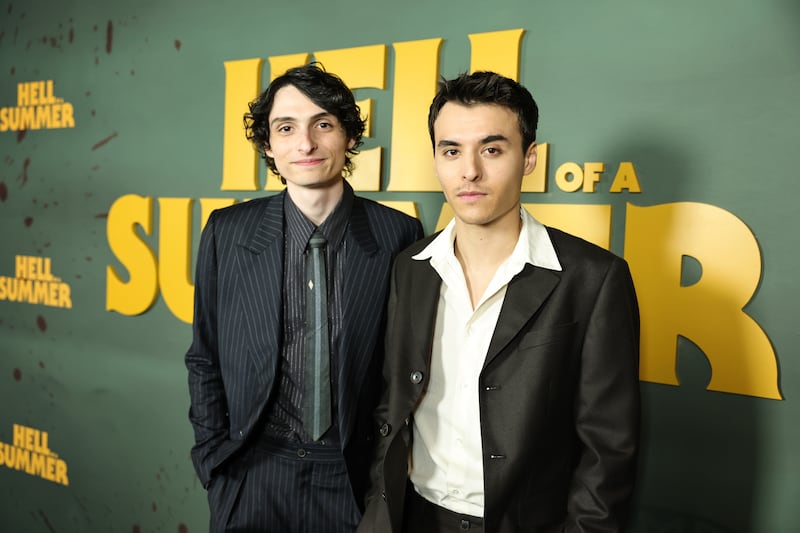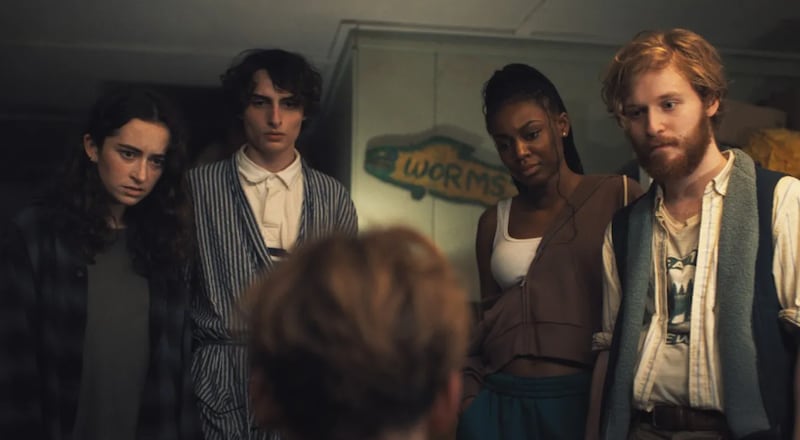Memories of summer camp are foundational for those whose childhoods included sharing bunkhouses with like-minded kids, fireside singalongs, and turning Estes rockets into instruments of mayhem by cutting slits on both sides of the body tube. Hold onto those halcyon days as you grow up, but please also recognize when it’s time to trade your camp trunk for a messenger bag, and move on to the next phase of your life–let’s say around the start of your twenties.
The dread of emerging adulthood is the soul of Hell of a Summer, the feature writing-directing debut of Stranger Things’ Finn Wolfhard and Billy Bryk, real-life chums since 2019, when they met on the set of Ghostbusters: Afterlife. Sharing a common irritation over interpretations of Generation Z in movies and TV, the two took matters into their own hands and began working on Hell of a Summer’s script the same year.
To score a turkey, they co-star as Chris and Bobby, showing up for good times at Camp Pineway, their estival home away from home; they contrast with Fred Hechinger, playing the somewhat-too-old-for-this camp counselor Jason, who’d rather make friendship bracelets than intern at a law firm. The law firm, after all, doesn’t have Claire (Abby Quinn), his longtime crush. On the other hand, it isn’t being stalked by a murder-happy psycho in a devil mask, either. Welcome to Pineway, unhappy campers.
Hell of a Summer, which is now in theaters, layers Generation Z glaze over a camp slasher blueprint, where, according to tradition, kids go to cabins in the woods and get made into bug juice. The film will be an object of debate for exacting horror fans; gorehounds may grouse about its slim carnage, and the didactically inclined may quibble over the lack of extra-delineated political allegory.

These miss the goal of the exercise, though. Wolfhard and Bryk wanted to show Gen Z plainly to the audience, sans patronization, in an environment that reflects the comedies they grew up with, rather than horror movies alone; where Ghostbusters: Afterlife and Stranger Things both use nostalgia for fuel, Hell of a Summer offers a personal and clear-eyed view of who the Zooms really are, past stereotypes and clichés. With the movie now in theaters, we spoke to the pair about bringing their perspective and life experience to a staple horror formula, and the disconnect in how older generations view Gen Z:
My understanding about Hell of a Summer’s genesis is that you guys wanted to fill a void in the modern horror, modern slasher space by making a movie that represents Gen Z’s perspective. I’m wondering if you could elaborate on that?
Bryk: Interestingly enough, I’d say the void we initially felt was that of coming-of-age and late-night comedies. Finn and I grew up on incredible late-night teen comedies, and they don’t exist in the same way anymore, certainly not theatrically. We wanted to make a movie that felt fun and exciting as a horror film, but also as a late-night, coming-of-age comedy for this generation.
In terms of the Gen Z aspect, it’s rare to get to make a movie about teenagers and young adults, and be that age while you’re writing and directing it, so this was an opportunity we were excited about.
True; movies like that tend to embrace nostalgia.
Bryk: We always talk about this misconception that I think exists among older screenwriters, and maybe older people in general, that there’s this massive generational gap between Gen Z and other generations; we feel there’s a much smaller gap than people realize, and more similarities between Gen Z and previous generations.
For us, it was about telling a story that felt authentic to us, in the sense that when we watch a coming of age comedy from the sixties, or the nineties, we can relate to the themes. Teenagers are teenagers. The experience of being young, and having to grow up and leave childhood behind, or being insecure about a budding romance, those are things people go through on a daily basis. We wanted to make a movie that spoke to our generation without speaking down, to tell a story we thought was funny and authentic, and that not only people from Gen Z would relate to, but people who were teenagers years and years ago.
I felt a lot of the anxieties that are associated with my millennial generation cropping up among the Gen Z characters. What generational fears did you intend to express? Horror catches on to whatever society is afraid of, whatever a culture is afraid of, at the moment that the movie is made.
Wolfhard: Yeah. I’d say the movie is about moving on to a different chapter of your life, which I think for a lot of people, for most people, is a non-linear thing, where you feel like you’re moving on in a lot of ways. You feel a bit complacent in your life, and stuck, like you’re in limbo, and I think that’s a universal thing. Being in your early twenties, no matter what, and honestly in any generation, you can have these moments where you’re lost and don’t know what the next step is, so you latch onto something you find comfort in, and makes you feel whole. At the same time, it does hold you back. That was what we wanted to talk about with the character of Jason, at least.
Right, Peter Pan syndrome.
Wolfhard: Yeah. Disney adults, that sort of thing.
Are you guys in that space? You both are doing, I would say, pretty well. Your careers are doing well. Right now you are out there promoting this movie you made together. At the same time, you aren’t immune to these fears. Is this something that occupies your own mental energy?
Wolfhard: I would say when we first started writing this film, we were writing it from the perspective of our characters [in the movie] at the time, as teenagers. We were worry-free, and we were writing stuff to make each other laugh. Now that the movie’s out, we’re actually closer to the age that Jason is in the movie. We understand that character now much more than we did when we first started writing, because [Jason] was based on a few different people that we knew, friends of ours that were a bit older.
Everyone, no matter what, in their mid twenties, doesn’t know what they’re doing. No one really knows what they’re doing, and everyone’s winging it. I feel that that is a universal thing.
I felt that way in my twenties. I feel that way right now!
Wolfhard: I feel like my parents don’t either! You think everyone has it figured out, and everyone has this life plan, but every day is just a different day, and you have to trust that everything’s going to be fine. There’s a lot of uncertainty in life, so we wanted to speak about that as two younger people.
Realizing everybody feels that way is cathartic. At the same time, things come up in this movie, like financial instability, financial competition, mental health, that weigh on millennials and Gen Z more so than Boomers.
Bryk: I think that informs our voice as young people who are more aware of that stuff. It automatically bleeds into these characters a little bit, as opposed to feeling like a conscious thing that we’re writing about. For a lot of people who are young, that just is their reality. The other thing I wanted to say is, there’s so much about insecurity, authenticity, and wanting to be liked. Everybody in the movie, they’re all desperate to be liked in some way. That was another thing we talked about: these characters are authentic to a fault. It ends up working to some of their benefit, and it’s what gets some of them killed.

It’s encouraging to think of how alike the generations are, how these aren’t necessarily new fears. But this is a frightening time to be alive. This is the world we live in, that I’m inheriting, that you’re inheriting. Does that add generationally specific weight to us?
Wolfhard: Definitely.
Bryk: It might! It is tough to answer, because when we wrote it, it was a different world. The fact that even writing the first draft pre-pandemic, the world completely changed in the months after, and of course that bled into the film. What happened, I think, and this isn’t something that we’ve thought all that much about, is that the movie became a lot more optimistic and wholesome by the end.
It was such a depressing time for so many people, that the first draft was more cynical, and treated the characters more as a joke. There still was heart to it, but it wasn’t quite as clear. As it went on, it became important to us to make a movie about combating these circumstances with optimism, love, and hope. I do think that was subconscious, that we wanted to make a feel-good slasher movie; that must have been informed by the circumstances we were making this in.
That clarifies the way the violence is approached in the movie; obviously, you go to a slasher because you want to see characters get offed, but there’s such an affection for these characters that the violence gets pulled back from. You wanted to make, as you said, a feel good slasher; is that a necessary part of doing it?
Bryk: There was a practical consideration in terms of what we can afford to show; practical effects are expensive. We didn’t have all that much money to make the movie, and we filmed in about 19 days, so we had to pick our moments to really try to make them shine. Another element was just from an audience perspective, of balancing the tone and never wanting to go too dark, and in the edit having to tone back some of the kills a little bit. If we ever got too dark and too gruesome in a way that stops being fun, then it’s hard to come back to the story that we’re trying to tell.
If you were to make another slasher, or another movie in this ballpark, would you give yourself permission to go wilder? I’m curious what that would look like.
Bryk: I’m curious, too! I think it depends on the story, but, Finn, if you want to say it…
Wolfhard: Yeah, like Billy was saying, it depends on the story and the characters…
Bryk: I was the political answer!
Wolfhard: We do have a script that does go crazier.
The post ‘Stranger Things’ Star Finn Wolfhard Just Made a Teen Slasher Comedy appeared first on The Daily Beast.



















